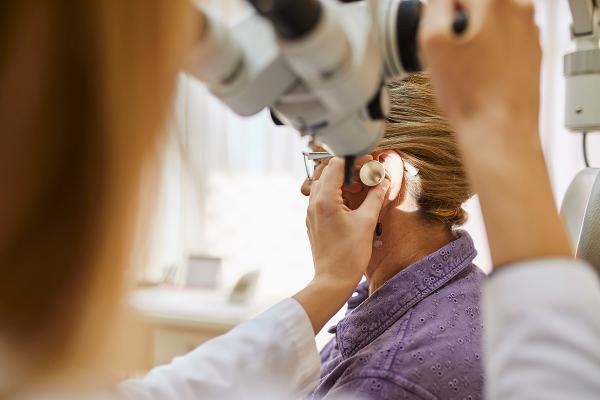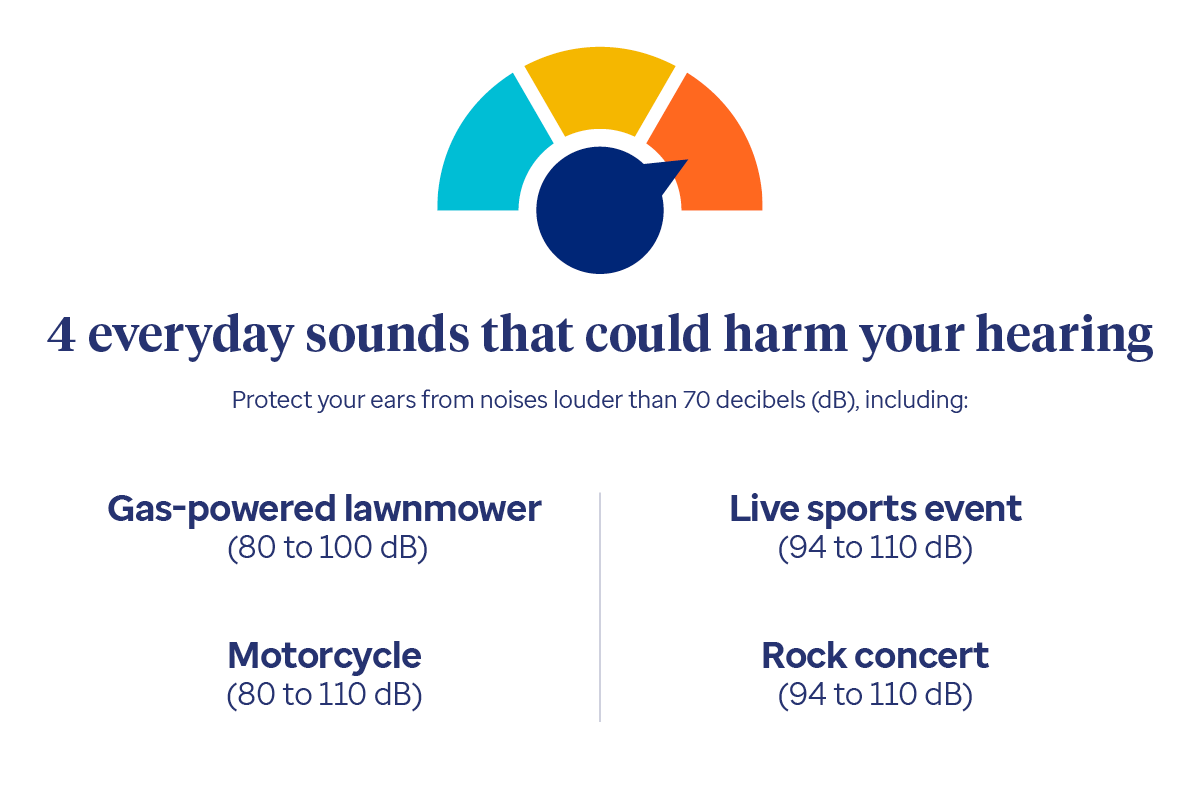
AARP Hearing Solutions helps members access hearing care professionals, no-cost hearing exams and more.
Treating hearing loss can be good for physical and mental health. Learn how to address hearing issues to help stay safer — and healthier.

Many of us will eventually experience hearing loss to some degree. After age 60, roughly two-thirds of people experience age-related hearing loss called presbycusis (prez-buh-KYOO-sis).1,2
But take heart: If you’ve already lost some hearing, the latest treatments are better and easier to use than ever. Here’s what you need to know about hearing loss.
How we hear and process sounds is a complex process. And it depends on many different parts of the ear working optimally.
Imagine, for example, that you’re talking to a friend while walking down a busy street. Loud cars and trucks whiz by, sometimes honking their horns. These sounds are picked up by the ears and move into the ear canal. This is the tube that runs from the outer ear to the eardrum, or middle ear.3,4
Once these sound waves reach the eardrum, they cause it to vibrate. It’s these vibrations that then cause fluid and hair-like cells to ripple and sway — all inside a tiny snail-shaped structure called the cochlea.3,5
All this movement activates tiny nerves in the ear, which then send electrical signals to the brain. The brain interprets those signals as either noise or words, and hearing happens.3
“One of the jobs of our brain is to take the sounds that we are hearing and give them meaning and context,” says Erich P. Voigt, M.D., a head and neck surgeon at NYU Langone Health in New York City.

AARP Hearing Solutions helps members access hearing care professionals, no-cost hearing exams and more.
Hearing loss may initially appear as an inability to hear what someone is saying when there is background noise, such as traffic in the street. Over time, you may lose your ability to hear higher frequencies (such as children’s voices) and certain consonants — especially s, f and th.4
According to the National Institute on Aging (NIA), you may have hearing loss if you have:5
If you suspect you have hearing loss, you can have your primary care provider check for anything physical that could be affecting your hearing. “It’s helpful to have a provider take a look in your ears to rule out earwax impaction or fluid buildup in the ear,” says Dr. Voigt. Both can muffle hearing.6,7
If that’s not the issue, then see a hearing care professional for a comprehensive hearing exam. You don’t need a referral to request a hearing exam and consultation through AARP® Hearing Solutions™ provided by UnitedHealthcare Hearing.
Your hearing care professional will do a series of tests to help determine:8
You can also take a preliminary hearing test online. While it may not give you official results, it might help you decide whether to get a comprehensive exam.
All of us lose some hearing over time, says Dr. Voigt. But there are certain things that can speed up hearing loss.

Hearing loss isn’t an isolated medical problem of the ears. It’s linked to an increased chance of other health-related issues.13 These include:
Ready to get your hearing checked? Early treatment may help lower your risk of other conditions like depression and memory loss. Request an appointment.
Many people notice hearing loss in their 50s, 60s and 70s but put off getting evaluated and treated. That’s a mistake, says Dr. Voigt.
The reason: The brain is a use-it-or-lose-it organ. As your ears send fewer frequencies, brain pathways lose their ability to understand them. Years later, hearing aids can amplify sounds, but your brain may no longer be able to interpret them.20
“The earlier you start using hearing aids, the better function you’ll have long term,” he says. “You want to keep stimulating the auditory pathways.”
You have two choices when shopping for a hearing aid: prescription hearing aids and over-the-counter hearing aids.
Prescription hearing aids: A hearing care professional can custom fit you with the right hearing aid for your hearing loss, notes Dr. Voigt. These hearing aids will amplify the frequencies that you’re missing.
“Hearing does change over time,” he says. “Prescription hearing aids can be programmed to match these individual changes.”
Over-the-counter (OTC) hearing aids: Since 2022, the U.S. Food and Drug Administration has allowed companies to sell hearing aids without a doctor visit or prescription.21
It's important to know that these hearing aids are meant for people with perceived mild to moderate hearing loss. They can be worn all day, if necessary, or in certain situations where you may find it hard to hear.22
If you suspect you have hearing loss, the first step is a hearing exam. No matter what your level of hearing loss, if any, you can take comfort in knowing that there are treatments that can help.
Sources
Information is for educational purposes only and is not a substitute for the advice of a licensed medical provider. Consult your provider prior to making changes to your lifestyle or health care routine.
The online hearing test is not intended to act as a substitute for professional medical advice, diagnosis, or treatment. Talk with your healthcare provider with any question about a medical condition.
AARP Hearing Solutions is available to all AARP members and does not require a health insurance plan from UnitedHealthcare. The AARP hearing program discount cannot be combined with any other discounts, promotions, coupons or hearing aid benefit plans unless noted herein. Products or services that are reimbursable by federal programs including Medicare and Medicaid are not available on a discounted or complimentary basis. AARP commercial member benefits are provided by third parties, not by AARP or its affiliates. Providers pay a royalty fee to AARP for the use of its intellectual property. These fees are used for the general purposes of AARP. Some provider offers are subject to change and may have restrictions. Please contact the provider directly for details. UnitedHealthcare Hearing is provided through UnitedHealthcare, offered to existing members of certain products underwritten or provided by UnitedHealthcare Insurance Company or its affiliates to provide specific hearing aid discounts. This is not an insurance nor managed care product, and fees or charges for services in excess of those defined in program materials are the member's responsibility. UnitedHealthcare does not endorse nor guarantee hearing aid products/services available through the hearing program. This program may not be available in all states or for all group sizes. Components subject to change.